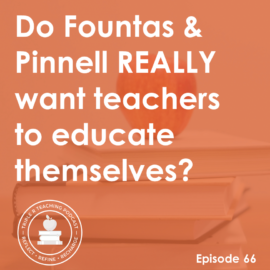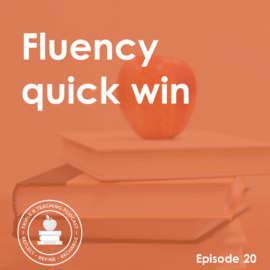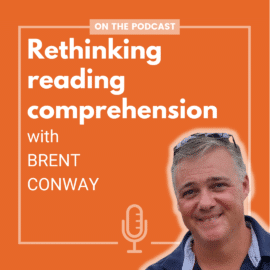
TRT Podcast#57: Reaction to Fountas & Pinnell #1 – But you CAN have conversations about the science of reading
Fountas and Pinnell tell us they’re staying out of the current debate about teaching reading because it isn’t productive. But there ARE safe, sane places to discuss the current research. Tune in to learn more!
Listen to the episode here
Full episode transcript
Hello, thank you for joining me! Anna Geiger here from The Measured Mom. This is Episode 57 of the Triple R Teaching podcast, but the first in a series in which I react to some blog posts from Fountas & Pinnell in which they defend themselves against what they call "mischaracterizations" of their work.
The first question they answer is two parts. The first part of the question is, "Why have you chosen not to participate in the latest debate about how to teach children to read?"
Let's listen in to find out how Irene Fountas answers this question: "Gay and I have lived through polarization before, and we simply don't see it as being productive. We choose to engage in conversation, and conversation is different from debate. Conversation enables us to learn more from each other and clarify our thinking with each other. We've never spent time criticizing others, and we respect multiple perspectives, and certainly feel that we can learn from multiple perspectives. Our focus has always been on advancing children's literacy learning and elevating the expertise of teachers. We have a complex view of learning, and literacy learning, and polarized debates about people's experiences doesn't contribute to the profession."
So let's react to this first part of the question and their answer. To be honest, I feel like this answer is a bit of a cop out. Basically what they're saying is that the discussion that's happening right now about the science of reading is a debate and they'd rather have a conversation, but there are plenty of calm conversations happening right now about the science of reading.
Now, it's true, you can go into Facebook groups where you'll have people yelling at you in all caps, people that try to shame you for not knowing about this sooner, and people who criticize you for the materials you use. Yes, definitely those kinds of people are present in any discussion out there.
However, there are a lot of safe places to talk about it. Let me give you just a few examples off the top of my head. The Reading League is excellent. I would check out and see if you have a Reading League in your state that you can join as a member or be a member of the National Reading League. I'm a member. They have a lot of great workshops that you can purchase at low cost in addition to your membership, and then you can watch them at any time. They also have a really nice, easy to read journal that gets sent out every few months. So yeah, I would definitely check out The Reading League.
There's also anything that you find by Margaret Goldberg. She's a teacher out in California, check out her website, the Right to Read Project. It has very gentle, kind, but upfront ways of looking at the current research and how that relates to balanced literacy - an approach that she used to follow. As you know, so did I. I know that one really excellent post she has on her website is "An Open Letter to Lucy Calkins," who a lot of people are angry with just like they're angry with Fountas & Pinnell. It is a very kind, open, well-worded letter.
So this idea that the discussion about the science of reading is a big debate and we just want to stay out of because it gets nasty, it's just not a good excuse because there are plenty of places to have a good discussion.
The second part of the question is "What advice do you have for teachers who feel caught in the crossfire while this literacy debate intensifies?"
Gay Su Pinnell answers this one, here's an excerpt from her answer: "We see these extreme emphases that come and go as not being very productive. We would encourage you to remain steadfast to your vision and values and keep learning more from the children you teach through careful observation and for making decisions based on the data that comes from those observations systematically taken. Keep doing what works for your children, the children you teach, and rely on observable reading and writing behaviors to guide your moment-to-moment teaching. You'll know more about the impact of your own teaching, and you can make those adjustments that you need to, to do the best you can at serving the needs of all."
There's some good in their answer. They talk about learning from your children through careful observation, for making decisions based on data that comes from observations that you take systematically, and to keep doing what works for your students.
But the thing is, you CAN do that and still study the science of reading and apply the current research to what you're doing. You should be doing both. I feel like they're saying it's an either-or, either you pay attention to your students and observe them, assess them, and use that to teach them, or you go on this other approach that everybody's talking about, but it's just a big debate. I feel like they're telling teachers to just put their heads down and plow through and just ignore all the noise around them.
But I know that as a teacher that wants to keep learning and growing, you don't want to do that. You want to know what's out there so that you can evaluate it and figure out how to apply that to the teaching that you're doing. So this idea that we just have to block out all the noise, because it's just not productive and keep doing what we've always been doing is not a good piece of advice.
I am sure that Fountas & Pinnell have received a lot of criticism that's come their way that hurts and isn't fun to hear because some people aren't very kind in the way they deliver it. So I could see why they're calling all this discussion a debate, a debate that's not productive, if people are just shouting at them and accusing them of things. But the fact is, as I said, there are a lot of places to have these conversations and YOU can certainly have these conversations.
There are different ways to have this type of conversation with the teachers at your school. One thing you could do is to do a book study together. A really good one for this is called "Shifting the Balance" by Burkins and Yates, because it actually comes from a balanced literacy perspective and shows you how to make changes to better align to the science of reading. It's kind of a transitional book, and it's an easy read. There are certainly other ones you could do, but I think that's a first step.
Another option would be to watch a presentation together because having people commit to reading a book and having a book study can be more than your teachers feel up to or can feel like a big ask. You could have a presentation that you all listen to at once and then follow it up with some discussion questions, maybe the same day or another day.
I actually have a presentation I've given to a few schools. It's called "Why I Embraced the Science of Reading After Twenty Years in Balanced Literacy". It's about a fifty-minute presentation in which I talk about my transition and then there's a brief introduction to the science of reading and how that applies to how we teach. I've gotten a lot of positive feedback on that. If you think that's something you'd like me to share with your school or district, I can do it via Google Meet or through Zoom. Go ahead and send me an email. You can send it to my team at hello@themeasuredmom.com, and we'll see if we can work something out.
So the bottom line today, I think that Fountas & Pinnell's excuse, because that's what it is, that they don't want to get involved in this big debate is really avoiding what they really don't want to talk about. They don't want to accept that some of the things they've been doing for years and years - since the nineties - are not backed by research.
Instead of encouraging teachers to study for themselves, what they're doing here is telling them to put their heads down and just keep going with what they've been doing all along. That's my take. Feel free to leave comments on the blog post, where you can find the show notes. I'd love to continue this conversation with you.
You can find the show notes for this episode, including relevant links, like the link to the Fountas & Pinnell blog post so that you can read it in its entirety, as well as the book that I recommended at themeasuredmom.com/episode 57.
We'll see you next week for our second reaction to the Fountas & Pinnell "Just to Clarify" blog series.
Sign up to receive email updates
Enter your name and email address below and I'll send you periodic updates about the podcast.







Les
Hi Anna, do you have a scope and sequence for phonemic awareness?
Thanks -Leslie
Anna Geiger
Hi Les!
Not really; kids should be working on phonemic awareness even in preschool. In general, this is the order of difficulty for phonemic awareness: phoneme isolation, phoneme blending, phoneme segmenting, and phoneme manipulation. Let me know if you have more questions!